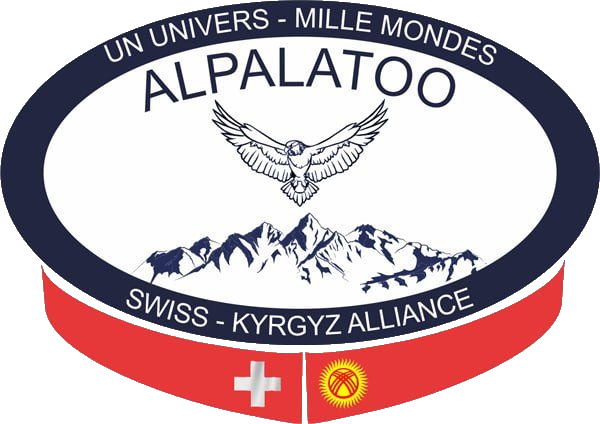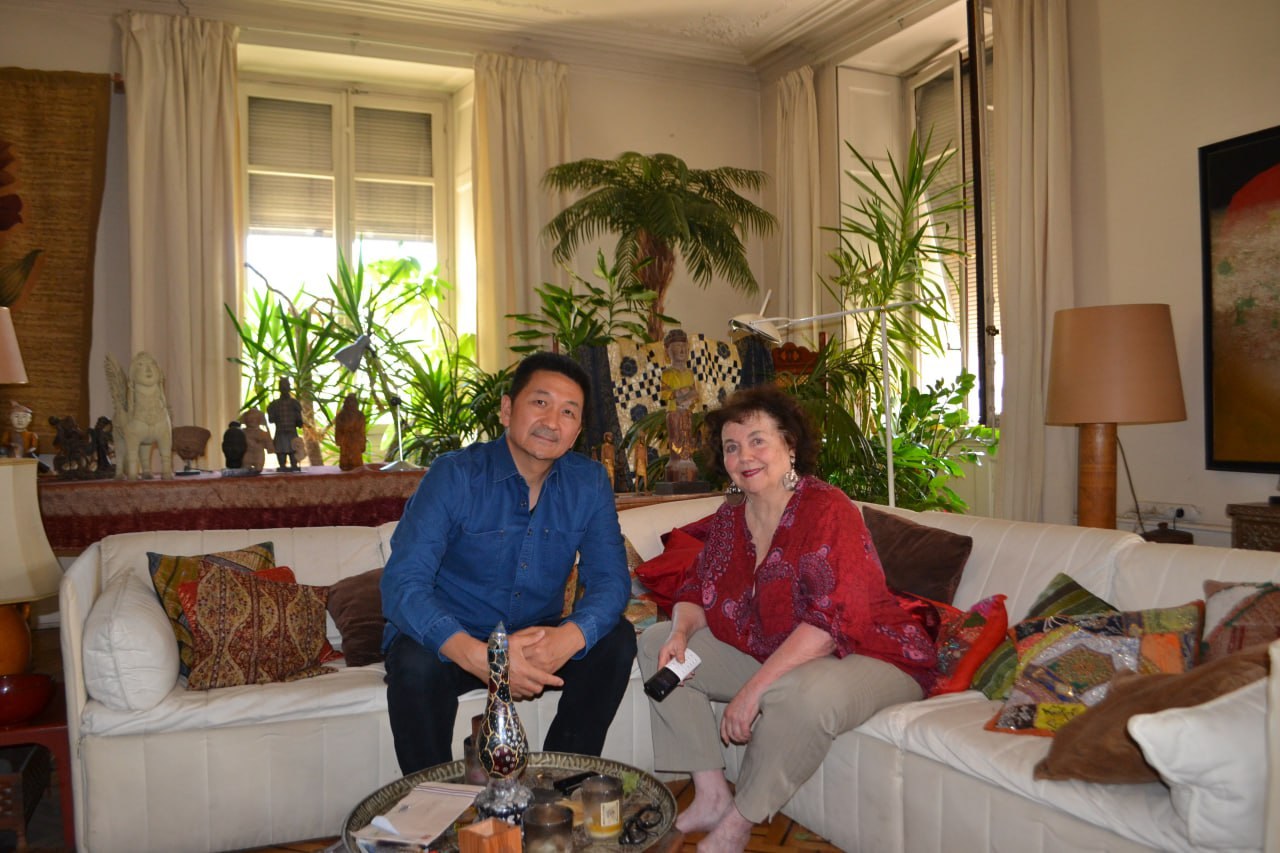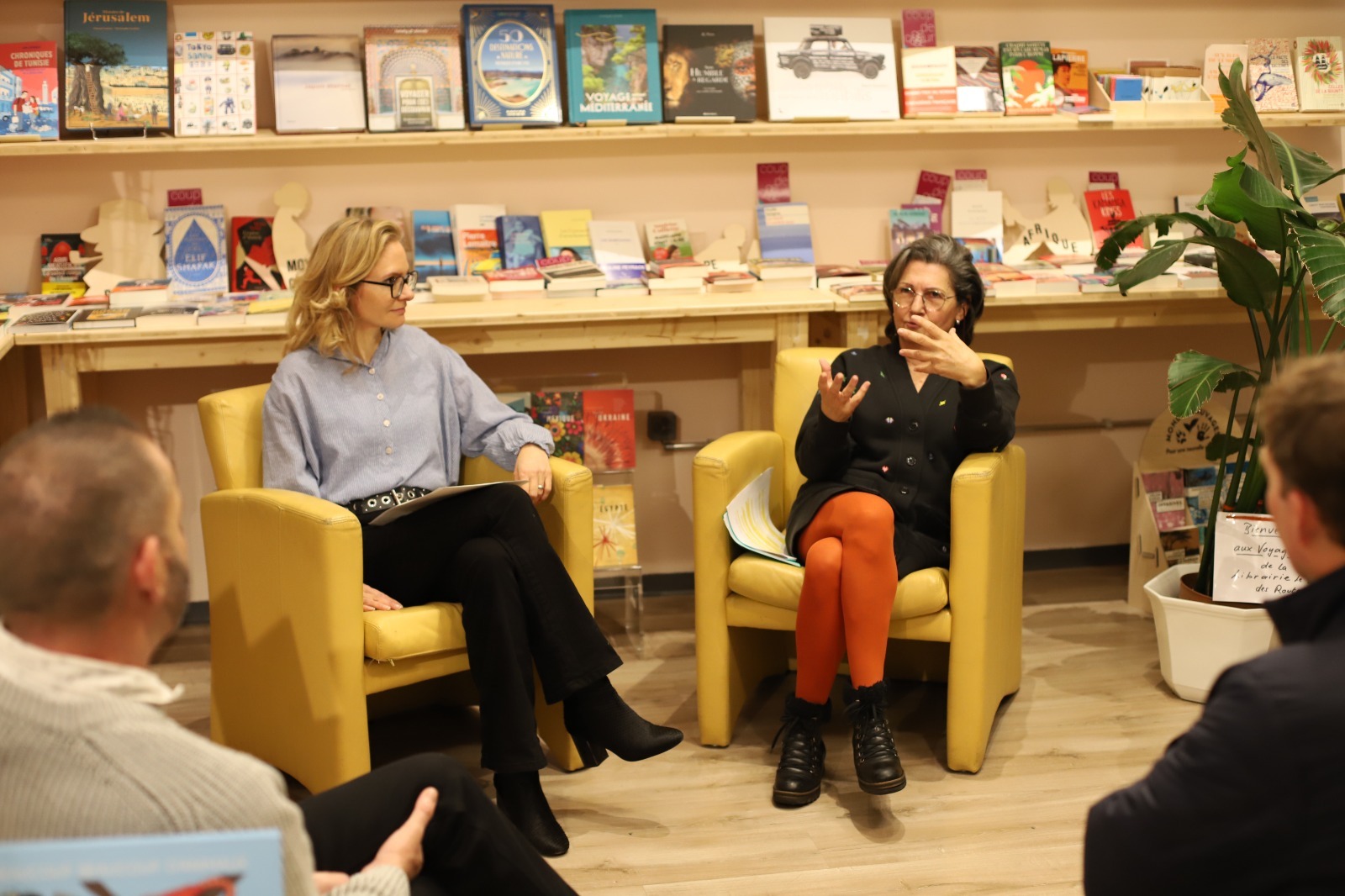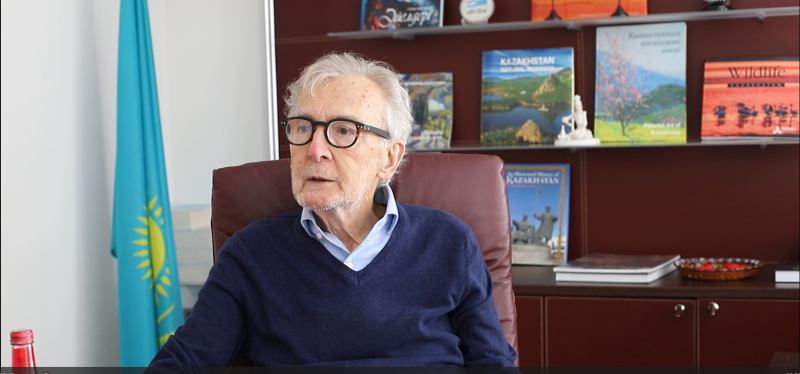Marcel Junod, the ICRC doctor to whom the United States wanted to award the Medal of Liberty.
A quiet hero of the Spanish Civil War and the major conflicts of the 20th century, who remained loyal to Swiss humanitarian commitment until the end — to the point of refusing one of the highest American distinctions because he was still serving under the Swiss flag.
–Did you grow up in Geneva?
– Well, it depends. I was born in London and spent the first six months of my life at my godmother's, at Peterborough in the Midlands. My mother was very anglophile and as my father was in Japan at the end of the war, she decided to give birth in London so I could obtain British nationality.
So I was born in London and held both Swiss and British citizenship until I joined the Swiss Ministry of Foreign Affairs. As a diplomat, you’re not allowed to have dual nationality; you must choose one... so I had to give up my British nationality.
My childhood problem was that my father was extremely busy. He had two roles: he was Vice President of the International Committee of the Red Cross and Head of the Department of Anesthesiology at the Cantonal Hospital. He worked 18 hours a day.
So my early memories are mostly of him being absent. He would leave very early in the morning to go to the hospital and drop me off at the International School, where I was a student, at 7 a.m. — two hours before any other students arrived. I remember being there alone with the janitors and the maintenance staff.
But you know, it was still a happy time. When you're a child, if you’re not maltreated, if you're not hungry and if you're not living in a war-torn country, life usually is good. And that was the case for me.
– So did you complete your education in Switzerland or elsewhere?
– I actually started my schooling in England, because my father had serious health problems. Perhaps it was related to his exposure to radiation in Hiroshima — he went there just after the the atomic explosion— but in any case, his health was fragile. He had a major operation in the 1950s and had to stop working as a surgeon, because surgery requires standing for long hours, and he could no longer stand for very long.
He decided to retrain in anesthesiology, which was the only medical job where a doctor could work while sitting. So we moved to England, and he studied there for two years. During that time, I became completely bilingual in English and French, and also spoke italian as my maternal grandmother was from Genoa. It was a very formative period of my life.
When I arrived in England, I was about four and a half. Before that, we had lived in China. After the war, my father no longer had a job with the Red Cross, so he went to see Maurice Pate, the director of UNICEF in New York. Pate offered him the position of UNICEF’s chief representative for China. We lived first in Beijing, then in Nanjing, until Mao took power — which made it impossible for my father to continue working there.
When we got to London, I didn’t even know how to use a knife and fork. I had only ever eaten with chopsticks, so my food had to be cut into small pieces so I could eat it! So you see, I had quite a nomadic childhood — moving from place to place — but still a happy one.
My mother was an exceptional woman — highly intelligent, especially emotionally. And even though my father was overwhelmed with work, he still managed to find time for me. Those were really beautiful years.
But you know, my father passed away when I was still very young. He had lost his own father at the age of 14, and I was about the same age when he died. Naturally, it leaves a deep void. I’ve always regretted not having more time to benefit from his wisdom and experience.
At least, he wrote a book, Warrior without Weapons which is a witness to all he lived through — the war in Ethiopia, the Spanish Civil War, and World War II. The book was his way of passing down his experience. And I was its first beneficiary. The book is still distributed today by the ICRC to young delegates, and is exciting reading.
But I have missed him terribly all my life.
– So, what did you do after primary school?
– I continued my education at the International School in Geneva. When my father passed away, my mother had the opportunity to start teaching French at the school. Naturally, without any income, things became very difficult for her. Fortunately, she received a small pension from the International Committee of the Red Cross, but she still needed to work.
She was hired as a French teacher in the English-speaking side of the school. She quickly ran into a problem: she used comic books and materials that the kids absolutely loved. As a result, by the end of the year, her students were way ahead of the others. The administration eventually told her, “Madam, please slow down a bit—otherwise your students will end up completely out of sync with the rest.”
– Were you already at university by that time?
– Yes, but my mother died while I was still at university. I suddenly found myself completely alone—I have no brothers or sisters. It was a very difficult time. I spent a whole year preparing for the entrance exam to the Ministry of Foreign Affairs, entirely on my own.
Of course, I was very tempted to follow in my father’s footsteps and work for the Red Cross. But I knew it wasn’t possible. He had left such a strong legacy—he was so well known—that I would always be seen as “my father’s son.” I wouldn’t be recognized for who I was. That’s precisely why I decided to pursue a different path—so I could define myself on my own terms. That’s how I ended up choosing a career in diplomacy.
– You were an only child, right? Were you spoiled by your parents?
– Yes, I suppose so. But my father died when I was just 14, so I wouldn’t say I was really spoiled. I think my parents believed in raising me with a certain level of discipline. I never felt like I was treated as someone exceptional.
We had a house in Lullier, on the Municipality of Jussy—it was my father who had bought it. I kept it until two years ago, when I unfortunately had to sell it.
– Your father studied medicine here in Geneva, right?
– Yes, he studied medicine in Geneva. Fortunately, he had a well-off uncle who agreed to pay for his studies, and my father later paid him back. He continued his training in Mulhouse, where he eventually became head of the surgical clinic.
One day, he received a call from a friend at the ICRC who said, “We’re looking for a doctor for a very short mission in Ethiopia – just a few weeks.” In the end, he stayed with the ICRC for ten years.
– How would you describe the state of medicine at that time?
– Medicine was fairly advanced already, but you know, major medical progress often happens during wartime. That’s when doctors discover new methods and treatments, caring for wounded soldiers and civilians in extreme conditions. My father was a doctor through and through. Even when he left the ICRC to work for UNICEF in China for three years, he always remained a doctor at heart.
When he returned to Switzerland, he had a serious health problem that prevented him from standing for long periods, so he could no longer operate. He turned to anesthesiology and went on to create the anesthesiology department at Geneva’s cantonal hospital.
At the time, each surgeon had their own dedicated anesthetist. My father found this system inefficient and proposed creating a team of anesthesiologists who could rotate and work with any surgeon. It made the whole process much more efficient.
– Did your father have brothers and sisters?
– Yes, it was a large family. There were seven children. I’ve kept in touch with some of them over the years, but we were never especially close. However, I had a very strong bond with my grandmother.
– And your diplomatic career, when did that begin?
– In 1972, I joined the Ministry of Foreign Affairs. At that time, we did a two-year training program: six months in the central offices in Bern, six months at the Graduate Institute of International Studies, and then one year abroad.
I was sent to Denmark. Since I had attended international school, my English was excellent, but I didn’t speak German – a must for a Swiss diplomat! They told me I would be sent to a German-speaking country to learn the language. So when I was assigned to Denmark, I objected: “But they don’t speak German in Denmark!” They replied, “There’s a small German-speaking minority in southern Denmark, in the Schleswig-Holstein region.” I said, “That won’t help me much,” and they simply told me to study German at home.
At the end of my training, the head of the program gave me a dictionary and said, “Here’s your final task: translate this into German. If you don’t understand something, give me a call.” He clearly wanted me to pass, one way or another.
– In which countries did you serve as a diplomat?
– I served in five different countries. First was Argentina, then I was sent to the UK – which didn’t feel very exotic since I was born there. After that, I was posted to Sweden for the Conference on Security and Disarmament in Europe. From there, I went to Colombia, then Ankara, Turkey. My final posting was in Yugoslavia, at a very difficult time, when the country was falling apart and Milosevic was ruling Serbia in a rather brutal way.
Back then, the Swiss Foreign Affairs Minister was Mr. Cotti, and I strongly disagreed with his policy. He clearly took sides against Serbia, which I considered was a betrayal of Swiss neutrality. I challenged him on that. But, as you can imagine, when you openly confront the head of the department, you don’t stay long. So I left the ministry.
Fortunately, I quickly found work with the Aga Khan Trust for Culture and became its head of Museums and Exhibitions. In fact, working for the Aga Khan turned out to be much more fulfilling than diplomacy, which has become overly bureaucratic. These days, embassies hardly serve any purpose – most diplomacy is done directly from capital to capital.
– Have you ever thought of writing a book about your life, like your father did?
– No, I don’t think my life has been exciting enough for a book. I’ll leave that to others. I have written quite a bit, though – mostly on niche subjects like ex-libris, which has been a lifelong passion. I’ve published several academic works on that.
– Could you tell me a bit more about your hobbies and collections?
– I started collecting ex-libris – book ownership labels – when I was 17, and it’s been a passion ever since. Now I’m turning 80 this October, and I think it’s time to stop. I plan to sell the collection. I’ve gathered about 100,000 ex-libris, which is a huge number.
– Can you tell us about your father's childhood – was it in Geneva or Neuchâtel?
In Neuchâtel. But, you know, there was a law back then: if a woman became a widow and returned to her canton of origin, her minor children assumed her original canton’s citizenship. So, when my grandmother returned to Geneva, my father was granted the right of bourgeoisie (civic rights) in Geneva. That’s why he, and later I, held dual bourgeoisie – Geneva and Lignières-Neuchâtel. That sort of legal arrangement no longer exists today. Laws have changed.
My father went on several missions for the ICRC when I was still a child. At the same time, he worked as Vice President of the Red Cross and as a doctor. He didn’t really have much time to tell me childhood stories.
– What were the main concerns or interests of Swiss youth during the time your father was growing up or becoming an adult?
Honestly, I’m probably not the best person to answer that. I was raised in a very international environment – not strictly Swiss. Sure, I’m Swiss by origin, but it never really defined me. I’ve always felt more attracted by the idea of universal citizenship than with national identity. Maybe that’s a flaw, but it led me to fascinating work after I left the Foreign Affairs Department.
I worked with His Highness the Aga Khan, who was creating the Museum of Islamic Art in Toronto. I contributed a lot to that project. He also had a project in Zanzibar to create an Indian Ocean museum – I worked on that for three years. Afterward, I created from scratch the Museum of the Horse in Chantilly. All of that was far more exciting to me than my diplomatic work.
– How does the State prepare young diplomats now, and how was it during your time? Are you satisfied with the system?
Diplomacy today has become an administrative affair, a State-to-State business. In Bern, diplomats now work directly with their foreign counterparts – thanks to the means and speed of communication, which have changed everything – without really needing embassies anymore.
Before, you’d send a telegram and weren’t even sure it would arrive. Things were slower, more deliberate. Today, you just pick up the phone or send an email. And look at the nonsense someone like PresidentTrump says – it’s broadcast live on TV. He wants to annex Greenland, turn Canada into the 51st U.S. state… completely ridiculous ideas.
He makes comments that no intelligent head of state – not in the past, not today – would ever make. We live in a totally different international landscape now.
Then you have a war criminal like Netanyahu, who is exterminating Palestinians just to cling to power. I have many Israeli friends who agree with me: they consider him a war criminal. But what can be done? Who can tell him “stop” today?
Sadly, we no longer even have a moral authority – no strong figure like Pope Francis used to be. A new pope was elected yesterday – maybe he will take on a larger role internationally? We don’t know yet. It’s a mystery... but I wish him luck!
– Since we’re talking about politics, what do you think of the state of media and freedom of expression in Switzerland?
Swiss media doesn’t have any guts – no backbone. They’ve all become victims of money, special interests, and pressure groups.
We’re living in a very different era from the one I grew up in. Just a few days ago, there was a TV program about Russia’s media war against European countries. It was quite striking.
This kind of technological war is becoming more common, more frequent. Unfortunately, it’s very hard to fight against.
On the other hand, information circulates very fast. People are aware. But the potential for disinformation is enormous.
– Why do you think the ICRC chose your father to go to Japan, rather than someone else?
He was already an experienced delegate. He had served in Ethiopia, during the Spanish Civil War, and by the end of WWII, he had truly proven himself.
So when someone was needed to go to Japan, it was a logical choice.
Until August 8, 1945, no one knew the atomic bomb would be dropped. My father took the Trans-Siberian Railway – it took him three months to reach Japan.
In Manchuria, he saw American and British prisoners of war held by the Japanese, including General Wainwright – the hero of Corregidor – one of the most senior American generals.
When my father arrived in Japan, he was able to report that Wainwright and Percival were still alive. The Americans were very happy to hear that.
So, when my father later requested 15 tons of relief supplies for the Japanese in Hiroshima, the Americans agreed immediately – they trusted him.
They even wanted to award him the Medal of Liberty, one of the highest U.S. honors. But since my father was still officially serving in the Swiss military, he couldn’t accept a foreign decoration.
I once discussed this with Bindschedler, the senior jurist in the Swiss Foreign Affairs Department. He told me, twenty years after the war, that he regretted the decision, but it had been the correct one legally.
– Outside of war, how did your father describe his life in Japan? Any personal memories he shared with you?
Yes, when he arrived in Hiroshima, a young Japanese doctor named Matsunaga guided him. My father told me that one day it started raining, and Matsunaga said, “Don’t worry – we’re not paper tigers.”
My father asked what he meant, and Matsunaga replied, “Paper tigers collapse apart in the rain. We don’t. We don’t fall apart.”
My father really liked that phrase – “We’re not paper tigers.” It stuck with him.
– Do you know how long your father stayed in Japan for his mission?
He arrived around August 9, 1945 – just after the Hiroshima bombing and just before Nagasaki.
He stayed until April the following year to take care of Allied prisoners of war.
It was chaos. There were no lists of prisoners, no idea where they were held – nothing.
Unlike the Germans, who had maintained strict prisoner records, the Japanese had not signed the Geneva Conventions.
So identifying and accounting for all the European and American prisoners was a huge task.
He barely slept during that period, and finally returned in April 1946. I was six months old when he saw me for the first time.
He was very tired.
We’ll never know if his early death – at 57 – was due to exposure to atomic radiation or just fate. But 57 is young.
— Did he receive the recognition he deserved from the state? After all, he dedicated his life and his health!
— No, at least not at the Swiss level. The ICRC paid tribute to him when he passed away, and there were three thousand telegrams sent upon his death, from all the national societies of the Red Cross. There was a funeral service at the Geneva Cathedral, where Max Huber, who was the ICRC president at the time, gave a eulogy. From that perspective, yes, the Red Cross recognized that he was an exceptional person who contributed in an outstanding way to the advancement of humanitarian law. But, you know, states don’t have recognition. They don’t have feelings.
— If you could ask your father one question today, what would it be?
— I’d ask him what we need to do to stop these wars. These senseless wars, these ridiculous wars like the one in Ukraine, and Israel and Hamas. The world has reached a point where tensions are boiling over. I’d ask him what he thinks could be done. But I don’t think he would have an answer. I believe he wouldn’t have one, because we’re helpless in the face of horror. When you see how many children and women are being killed in Gaza, when you see the senseless cruelty of drone attacks... In the end, war is becoming dehumanized. Before, you had a bayonet on your rifle, and you had the other soldier in front of you, and you had to kill him. Now, it’s much more neutral, sterile, clean. And I don’t see how we’ll get out of this. I think the next phase will be war in space, with the possibility of launching military operations from space. But in any case, I won’t see that—it’ll be for my children. And honestly, I’m full of it. Seriously.
— Your father must have been upset, disappointed, of course. Your answer was very strong! So, to wrap up this conversation about your family, is there anything else we should add? Maybe something about family, childhood, parents?
— Well, I think what’s interesting is that my father was first and foremost a doctor. He was from Neuchâtel, though he lived in Geneva. He always said that the special thing about Neuchâtel is that the best French in Switzerland is spoken there. He was very proud of speaking good French because he said, “Words matter. If you don’t understand the words, that’s where the problems start.” My mother, on the other hand, was a polyglot. She spoke English and Italian perfectly and had a very developed cultural background. My father, however, had learned English by reading detective novels. Lady Limerick, the president of the British Red Cross at the time, used to say that my father’s English came from Perry Mason and Agatha Christie books! So, it was sometimes a bit difficult to communicate with him in English.
But all of this gave me a true sense of the importance of communication. My father was Protestant. All his ancestors were pastors. My mother was Catholic. And my father’s older sister used to put leaflets against mixed marriages in my mother’s mailbox when she was engaged to my father. His family disapproved of their union. Today, thankfully, we are so far from those concerns...
As for me, I became Orthodox. Want to know why? Because my two children are Orthodox. Their mother is Serbian, and they were raised as Orthodox. One day, I thought, "You’re Catholic, but how can you belong to a different religion than your children?" I wasn’t going to ask them to become Catholics; they would have told me to go away. So I asked myself, what’s the difference between Catholics and Orthodox? And I realized that apart from the famous filioque, there isn’t much difference. So I decided to become Orthodox. And honestly, I’m very happy with that decision.
All of this is very personal, of course. But I believe we should never hold onto prejudices. I have a very good Indian friend who is Hindu, and we’ve talked about religion a thousand times. She told me, “For me, Hinduism works.” And I said, “If it works for you, then stay Hindu! Why change?” Do we really have to change people? I don’t think so.
— Do you have any regrets that might linger with you as you approach the end of your life?
— Regret is useless. What happened, happened. What’s going to happen, we don’t know, but it will happen anyway. So, I think we must be philosophers. We must say that if we can influence things, we should do so positively. But sometimes, it may be even more important not to influence than to influence negatively. Regret is pointless...





